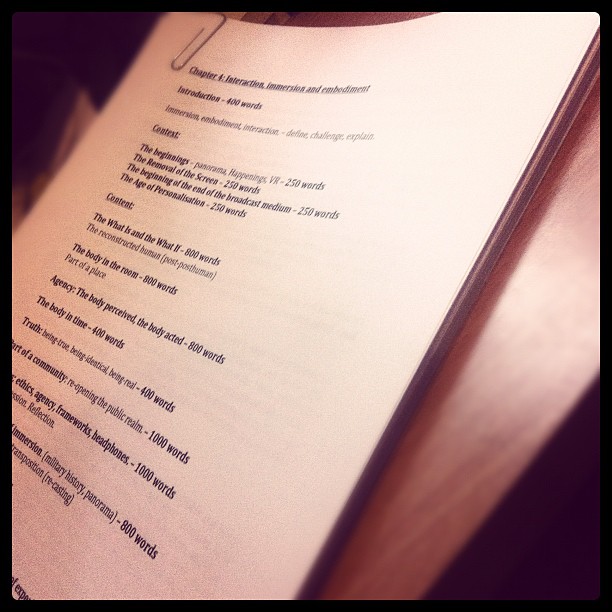
So I’m burrowing away in the old PhD at the moment. Only about 4 months to go so I’m in the process of researching and writing the last chapter and some case studies, before heading into full redraft ‘let’s make this make sense’ territory. Re-reading chapter 2 (written in my first year) as I work up some case studies for it, for example, made me simultaneously proud of how far I’ve come and weep at the job I’ve yet to do. Anyway, for those of you who don’t know (actually that’s everyone including my supervisor because I tweaked it, again) my thesis title is roughly this:
First-person theatre; how performative tactics and frameworks (re)emerging in the digital age are forming a new personal-as-political
I’ve just finished writing a chapter called “First-person theatre and the body; transcendance vs. transposition” which is all about phenomenology and interactive theatre and why it’s better than immersive theatre in dealing with the frameworks/systems that make up the politics of daily life, and is more effective in terms of tackling the specific breed of capitalism expressed in/via personalisation and pervasive media. Anyway, a big part of talking about interactivity, and a bit part of talking about interactivity demanded defining it. This is a definition I’ve had knocking around in my head for a long while, and which has been informed by my reading since (obvs) and I go on about it so often, and rant so much at people claiming their work is interactive when it isn’t (and doesn’t need to be! ‘Interactive’ is not a synonym for ‘good’ or ‘relevant’ or ‘appeals to young people’) that I thought I may as well post my definition. Y’know, so it’s Out There. So here follows a short extract (extended quote, really) from draft one of chapter 4 of my thesis. Enjoy. If this is your kind of thing.
[…]
At this point it seems appropriate to offer some definitions for words to be used herein that are largely overused with regards to contemporary performance, and indeed most interfaces between the story- and real-world (marketing, News, other art forms, entertainment, etc.); those of ‘interaction’ and ‘immersion’.
Interaction.
The misuse of the term ‘interactive’ – or rather the necessity to talk in greater specificity when discussing interactivity – has been highlighted in more detail in the discussion of games and first-person performance in chapter 3. Steve Dixon likewise raises the issue of ‘levels’ of interaction in his extremely thorough Digital Performance (Dixon, 2007, p. 563). Here we attempt to refine these, along with other notions on the subject discussed in chapter 3 and set forth in other works such as Rules of Play (Salen & Zimmerman, 2004) and Pervasive Games (Montola, Stenros, & Waern, 2009), to form the following four ‘levels’ of interactivity:
- Reactive
- Navigational
- Conversational
- Emergent.
Continue reading What we mean when we talk about interaction.

